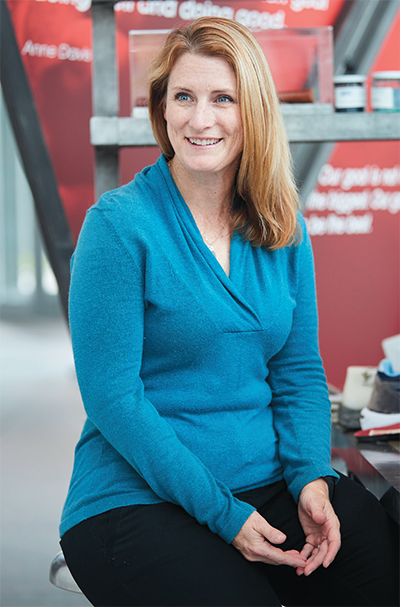
“The conversations with the students are insightful,” Renzi said. “(They) engage and have a lot of questions about my career, the work we do, and life outside of school.”
CLTP convenes local professionals, alumni, and other individuals looking to give back for several hours on multiple days during the spring and fall semesters. Coaches receive an overview of intended outcomes for students, and are instructed to observe and provide one-on-one feedback as students analyze case studies and work to solve a business ethics problem.
While coaching, Renzi accentuates self-reflection and self-awareness. In the past, she has helped students improve everything from body language to their problem-solving ability.
“Going through [coaching] as a student, I found the conversation with my coach incredibly beneficial,” Renzi said. “I wasn’t aware of what I was doing in some cases. Having objective feedback from someone who was interested in giving it, rather than waiting to get into a challenging situation, was really helpful.”
Renzi worked in financial consulting before joining New Balance in 2006. She has held a variety of roles at the company during the past 13 years and now serves as the head of strategy for the Direct to Consumer division. She started working with CLTP shortly after graduating and participates annually.
“To be successful, the program requires a lot of coaches,” she said. “I know my volunteerism, including the hours I’m putting in, has a large impact on the Babson community.” – Bryan Lipiner
]]>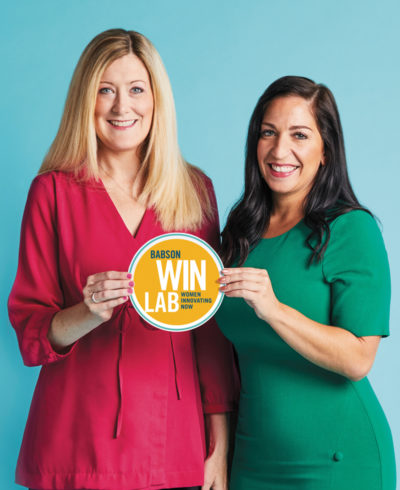
Kara Miller and Michelle Abbs
Photo: Pat Piasecki
Kara Miller
Why is WIN so important?
WIN creates a pipeline of high-growth women entrepreneurs by providing resources that will allow them to grow faster. Currently, less than 3 percent of venture capital dollars go to women entrepreneurs, and when we launched the program, women held only 13 percent of the seats in top accelerator programs. The WIN Lab in Boston is made up of Babson undergrads, graduate students, and alumnae. About one-third of the cohort are women from the broader entrepreneurial ecosystem in Boston.
What are you looking for in these companies?
We’re looking for women entrepreneurs who are thinking big and want to grow large, scalable ventures. One example is Mighty Well, a team of three Babson alumni who started the company in their dorm room when they were undergraduates. Mighty Well creates PICC (peripherally inserted central catheter) covers and other devices for people undergoing medical treatment. Co-founders Emily Levy ’16 and Maria del Mar Gomez ’16 won the Draper Competition, an undergraduate competition for women entrepreneurs, in 2016. Quite a few women have raised funds—more than $13 million between the Boston and Miami labs—and have appeared on shows like “Shark Tank.”
Why do you love this job? Why is it a good fit for you?
I love working with entrepreneurs who are passionate, innovative, and dedicated to what they do. And I find it so incredibly inspiring and rewarding to be part of their entrepreneurial journey and help them identify the resources they need to scale and grow and reach their dreams. From the start of the program, we work with all the “WINners” to identify the goals they’re looking to reach by the end of the program. We help them achieve those goals through the WIN curriculum, network, and coaches who provide expertise. Watching people’s visions come to life is amazing. My job gives me the opportunity to be part of that journey as the entrepreneurs tackle challenges, overcome obstacles, continue to meet milestones, and make strides along the way.
Michelle Abbs
Why is there a WIN Lab in Miami?
The WIN Lab started here four years ago. We were the first Babson presence in Miami programmatically and came because Miami is the College’s fourth-largest alumni area in the world. Some members in our first cohort were Babson alumnae, but the majority of the participants were community members, so WIN was their first exposure to Babson. I think it’s a very unique program offering, different from the ecosystems in Boston or San Francisco where our names might be more well-known.
What makes this job so interesting for you, and what would you like people to know about what you do?
People ask why we need a program for women entrepreneurs. Here’s the reality: Women face unique challenges in entrepreneurship that men will never experience, period. Whether it’s gaining access to capital, managing expansion while underfunded, or being left out of networks, these hurdles are very real, and I see the impact of this kind of gender bias every day. I’m fueled by the idea that we can make a significant difference in the lives of the entrepreneurs who join the WIN Lab and its surrounding networks. We have a long way to go to change the headlines appearing today, but I am inspired to work hard for the fierce, relentless women who are determined to defy the odds instead of being discouraged by the statistics.
Why do you think you’re such a good fit for this job? Why do you love it?
I’m an educator at heart, and seeing the lightbulb moments from our entrepreneurs really lights me up inside. When participants come into the program, they feel like they don’t know how to do something—or they can’t do something as well as they would like to do it. Then, by the end of the program, they’re completely transformed. That gives me so much energy and inspiration. – Kara Baskin
She is a mother of two, for starters, and she works at pharmaceutical company Sanofi as a director of analytical science and technology.
She also is board president at the Wellesley Chinese Language School, an institution she helped launch a decade ago because she saw a glaring need for the language and cultural instruction it could provide. She and her co-founders worked night after night into the wee hours to make the school a reality.
Despite all these responsibilities, however, Kochling is driven by a need to push herself even further. She is not content to be still. “I love challenges,” she says. “I am constantly looking for new ideas.”
For that reason, Kochling enrolled at Babson. She always had wanted to earn an MBA, and with her children growing older—one now in college and the other in high school—she thought the time was right. She hopes the degree will be a springboard for more career opportunities.
Earning an MBA also allows her to experience the joyful and fulfilling act of learning, something she values greatly. “Learning is part of me,” Kochling says. “I love to learn new things.”
Babson is a place that believes learning doesn’t end at age 21 with a walk across the stage and a mortarboard toss into the air. For sure, balancing education with adulthood’s many commitments isn’t always easy, but continuing to pursue learning opportunities can be rewarding and, frankly, essential to a vibrant career. With extensive courses and programs available at Babson Executive Education (BEE) and the F.W. Olin Graduate School of Business, including a fully online MBA degree launching in January, the College believes it can be a lifelong home for those seeking knowledge.
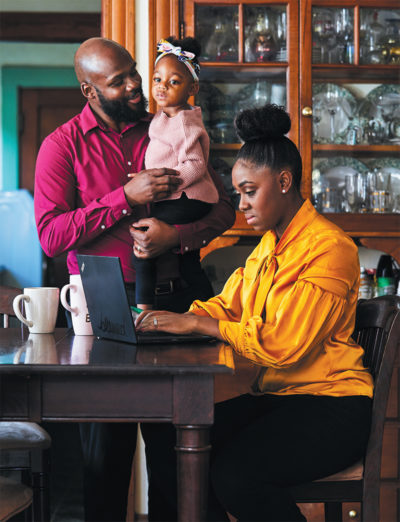
Chavon Cham MBA’18 at home with her husband, Gilbert, and daughter, Noah.
Photo: Pat Piasecki
“We can be here when you’re an undergrad, and a grad, and an early-stage professional, and as you advance throughout your entire career,” says Karen Hebert-Maccaro, BEE’s CEO. “We want to partner with you for every stage of your life.”
Constantly Evolving
Learning can’t stop because the world doesn’t stop. Technology is moving forward. Skills grow outdated. “Work is constantly evolving as it becomes more global and digital, and most jobs are slowly being replaced or reimagined through technology,” says Keith Rollag, the Murata Dean of the graduate school. “Staying productive, successful, and employable over time means we need to constantly learn new things.”
Hebert-Maccaro recommends that employees look at learning almost like going to the gym. “For physical survival, you need to pay attention to what you eat and how you exercise,” she says. “For intellectual survival, you need to exercise those mental muscles as well.” And, just like going to the gym, finding the time to learn can be a challenge. “We all have to juggle a lot in our lives,” Hebert-Maccaro says. “The most successful people will figure out how to juggle family, life, and continuous professional reinvention.”
Dr. Jason Simon MBA’20 knows all about that juggling. He’s an orthopedic surgeon at Newton-Wellesley Hospital, and sometimes when he’s supposed to be in class, he’s in the operating room.
He’s also the father of two daughters in grade school, and they occasionally pop up on the screen when he’s on a WebEx conference with his Babson classmates. Additionally, Simon is a senior executive at 1854 Cycling Company, a bicycle and apparel brand that provides jobs to formerly incarcerated people. “It’s a big social mission project, and that’s why I make time for it,” he says.
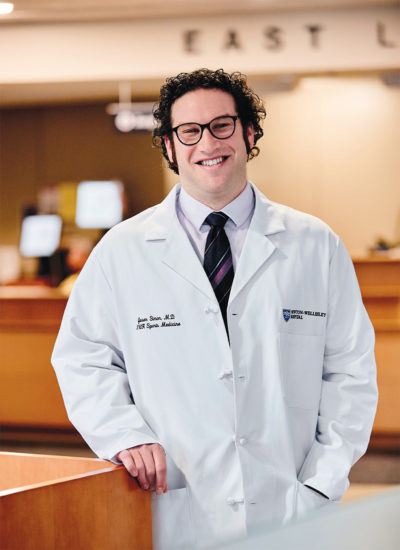
Dr. Jason Simon MBA’20 at Newton-Wellesley Hospital.
Photo: Michael Quiet
Of course, Simon is used to going to school and being busy. He is a doctor, after all. He experienced the whirlwind that is medical school. “In medicine, school never ends anyway,” he says. “I am fairly certain I haven’t slept since 1997.”
Simon decided to earn his MBA because the business of medicine is shifting. “It’s not really run by physicians but by practice managers who have a business, not a clinical, background,” he says. Finding himself surrounded by people “throwing out business terms,” essentially speaking a language he didn’t understand, Simon decided to apply to Babson. “The reason I’m in medicine is to take care of people,” he says, “but if that’s hampered by the way medicine is changing, you have to change.”
Like Simon, Chavon Cham MBA’18 decided to pursue an MBA to aid her career. When she studied at Babson, she was a New Balance product manager but preparing for a shift. Instead of focusing on product creation, she was aiming for a position that was more strategic, more global, more big picture. “I wanted to manage the business from a strategic point of view,” says Cham, who today is a global product manager for women’s lifestyle footwear at New Balance.
Also like Simon, Cham had to do some juggling to make her education work. During her time at Babson, she not only gave birth to her daughter, but she also planned a wedding. “It was very busy,” she says. Cham’s professors and fellow students were supportive, however, and she learned to manage expectations with class projects. “I couldn’t be the first person on every discussion board every week. There were times I had to flex,” she says. “It was about setting boundaries.”
Cham was enrolled in the Blended Learning MBA program, and she found its mix of online and in-person sessions provided flexibility that worked well for her bustling life. “You picture an MBA to be way more stuffy and conservative,” she says. “That wasn’t the experience for me at all. It was feasible and doable.”
Always a Babson Student
The Blended Learning program may be flexible, but some potential students live too far away to be able to come to campus regularly. Babson is striving to change that. “We want to expand our impact by reaching more students,” says D.R. Widder MBA’99, Babson’s vice president of innovation. “We want to foster entrepreneurship and Babson everywhere, and being online is a prerequisite to being everywhere.”
In January, Babson will begin offering an MBA program fully online. Other online programs will follow. “The main goal of online is to reach those students who can’t reach us,” says Widder. “We want to give people a way to get the world’s best entrepreneurship education wherever they are.”
Increasing access to what Babson offers is a goal at BEE as well. It already provides a robust selection of open enrollment and custom programs for individuals and companies, but Hebert-Maccaro wants to do more. Whether an employee needs to solve a problem in the moment, requires a new skill, or clamors for a complete career transformation, she wants BEE to be the place where they can gain that expertise. To do that, BEE could provide a variety of offerings—a class, of course, but also a podcast, a video, or whatever else is required. “I am bullish when I’m thinking about the potential Babson has,” says Hebert-Maccaro.
The mission is to further empower a life to be spent in learning, a life only beginning when one crosses the stage with a diploma in hand. “We all should be continually learning,” Widder says. “Once a Babson student, you are always a Babson student.”
]]>These guides typically are Babson graduates who have achieved success in their fields and are eager to give back. In turn, the relationships they develop with students add a rich layer to their own professional development.
Take Hugh Glazer ’77, P’13. He spent the early part of his career as a certified public accountant, working at the New England Journal of Medicine and Simon & Schuster. Today, he runs the WinterView Group, which provides CFO services to private companies and nonprofits.
He also is a business advisor in the 10,000 Small Businesses Program, a joint venture between Babson and Goldman Sachs. The program, which provides access to education, capital, and business support services, is “a 13-week business bootcamp for CEOs,” he says, many of whom are trying to grow their families’ small businesses.
He reflects on a young woman who was overwhelmed by taking over a family business from her parents because she’d never had an active role in it. When Glazer suggested a change, she said, “Are you really going to give me permission to do that?” It was a watershed moment for the nervous entrepreneur.
“I said, ‘It’s got nothing to do with me! You have to give yourself permission.’ This is how a mentor can help someone—be a sounding board.”
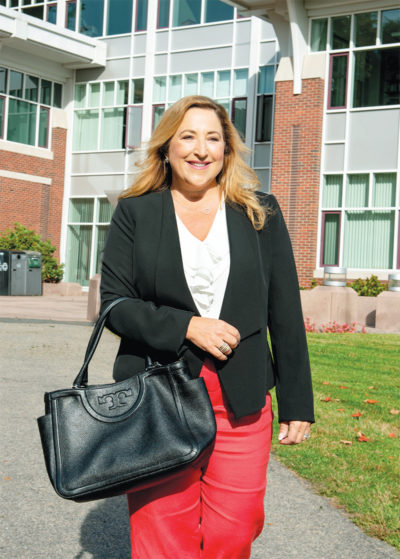
Dana Harris MBA’91 is on campus regularly for mentoring and guest lectures.
Photo: Webb Chappell
Glazer serves as a coach through Babson’s Coaching for Leadership and Teamwork Program (CLTP), which provides undergraduates with one-on-one developmental coaching on their leadership, communication, and interpersonal skills early in their careers. He has been involved with the program since its inception, brought along by Professor Joe Weintraub, CLTP founder and faculty director, a longtime friend and mentor. In his session of the program, roughly seven students participate in a two-hour case study that they’ve never seen before, receiving real-time feedback from seasoned coaches such as Glazer. Students participate in their first year and again as juniors or seniors, sharpening their analytical skills.
“This is one of the programs that have drawn accolades for Babson,” he says. In addition, his work with students and other coaches has changed his outlook.
“Oftentimes, you might make a snap judgment. ‘Gee, wow, this person is going to be tough to work with.’ And, once you get going, you find out they have all kinds of insights. So, for me, the CLTP program over the years has really taught me an awful lot about managing people, interacting with people, and how to just judge people on what they say and do, so to speak, versus what your visual cue might sometimes say to you,” he says.
Professional Gratification
Dana Harris MBA’91 is a partner at Red Javelin Communications, a boutique PR and marketing agency, focusing on technology and industrial companies. She is a longtime B.E.T.A. (Babson Entrepreneurial Thought & Action®) competition judge through The Arthur M. Blank Center for Entrepreneurship, as well as a regular mentor and a marketing guest lecturer. In April, she was an advisor in the Mega Mentoring session at the Founders Summit centennial series of workshops. There, 100 alumni matched with 100 student entrepreneurs for discussions. Harris consulted on brand messaging and marketing.
“You almost feel like (the participants have) full-fledged companies, but they’re students. They’re doing double time over at Babson,” she says, laughing. “It’s unbelievable and so impressive—not something I could’ve been doing back in my day.”
She recalls meeting with Ryan Lupberger ’18, a founder of CleanCult, a subscription service that aims to deliver effective, nontoxic laundry pods. Seeing her direct mentorship provide real results for Lupberger’s team was a rewarding experience, Harris notes.
“They wanted to pursue similar branding to a competitor and wanted tips on how to do that. I was able to provide advice on how to use content to create relationships with customers—how to use video, SlideShare, social media, and blog posts—and give them advice on their brand voice. This company went on to win the B.E.T.A. Challenge and the MassChallenge, which are two very prestigious startup competitions in the Massachusetts area,” she says.
“Seeing someone else take my advice and then applying it was so gratifying—and it validates my own education. I felt that it made my experience valuable in a way it never did before. I’d say that is the one thing that I really love about mentoring: It gives me a newfound sense of responsibility and achievement in reaching a career milestone where I’m able to help people and give back.”
Learning From Students
Chris Jacobs ’10, meanwhile, brings his entrepreneurial talents directly to the classroom. As the founder and CEO of Honest Discounts, a company that provides savings on prescription drugs, he has regularly taught Professor Len Green’s Ultimate Entrepreneurial Challenge class. (Bloomberg Businessweek named Jacobs one of America’s best young entrepreneurs in 2009.)
Jacobs calls Green the “Obi-Wan Kenobi” of Babson. “He’s the ultimate mentor,” Jacobs says, noting that he was honored to be a guest lecturer.
“It’s a long-running class, and it fills up right away. It’s an amazing experience. … Everybody wants to take it. All the (students) who want to build companies want to take it,” he says.
Jacobs presents case studies from his company without disclosing its name, allowing students to present their ideas. Then, he tells them what actually happened and grades each presentation. Mentoring these blossoming entrepreneurs has helped him think about his business in different ways, he notes.
“When you teach someone something, it really forces you to think about what you’re saying and how to articulate it,” he says. “When I start talking about a sales operation strategy or I come up with an idea for a student, a lot of times I think, ‘I should be doing that myself!’ Just through talking about the student’s problem and how I would solve it makes me a better problem-solver.”
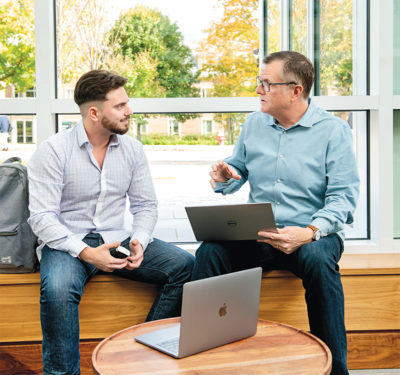
Dillon Galynsky ’20 talks to his mentor and friend, John Grayson MBA’97, P’20.
Photo: Webb Chappell
An Enduring Relationship
Sometimes mentorship results in a long-term friendship. John Grayson MBA’97, P’20, executive vice president of Agbotic Inc., met student Dillon Galynsky ’20 through the Babson Summer Venture Program as Galynsky launched HUSH, a smoke filtration device that eliminates fumes and odor, captures ash, and reduces secondhand carcinogens.
“Business success is often measured in dollars and cents, but a successful mentor-mentee relationship produces a meaningful and long-lasting impact at a personal level,” Grayson says. “That’s hugely rewarding for both the mentor and mentee.”
“We just hit it off,” recalls Galynsky. Grayson took an interest in him as a person, not merely as an entrepreneur, he adds.
“We ended up meeting outside of Babson and spending more time together. It first started from a mentorship capacity, and then it grew to a friendship, which is very important because there’s a level of trust that evolves over time. I’d call John and ask him questions about my life that didn’t even have to do with the business,” he says.
For mentors, the end goal—seeing students succeed—is as fulfilling as their own careers.
“Babson has been able to turn out fabulous students who are just so entrenched in taking their education, what they’re learning in the classroom, and bringing it into the real world and applying it in companies in ways I’ve never seen before,” says Harris. “It’s amazing.”
]]>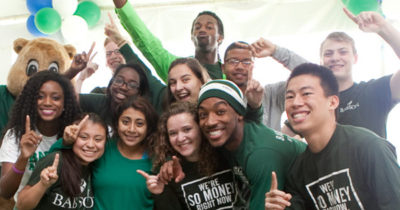
The Babson 100
In its first century, Babson flourished thanks to the people and events that helped shape it. See what the Babson community has chosen as the College’s 100 highlights.
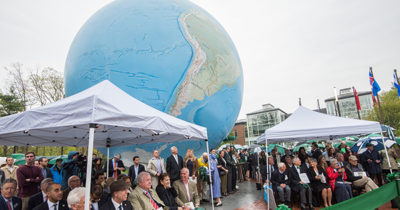
A New Home for the Babson World Globe
The Babson World Globe finds a new home in Kerry Murphy Healey Park, named for the former president. Located along College drive, it boasts flags, markers, and a statue of Roger Babson.
New Home for the Babson World Globe Officially Opens »
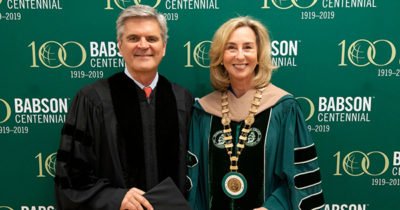
Babson Celebrates Centennial Commencement
The College sends off the 2019 undergraduate and graduate classes with Commencement events featuring speakers and honorees. Special events also included celebrations for Posse scholars and a Lavender Graduation that recognized graduating LGBTQ+ students.
Centennial Commencement Caps Off Celebratory Week »
Honoring Babson’s Undergraduate and Graduate Faculty of the Year »
‘Some of You Have Already Changed the World’ »
Babson to Award Eight Honorary Degrees at Centennial Commencement »
Babson Posse Scholars Celebrated in Sendoff »
‘Even in the Most Unexpected Situations, Babson Always Had My Back’ »
Steve Case: Collaboration Will Be Key to New Era of Entrepreneurship »
Toyoda Encourages Graduates to Be Warm; Find Joy in Life »
LGBTQ+ Graduates Honored at Annual Lavender Graduation »
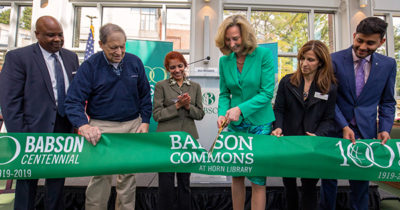
Conversation and Creativity: The Babson Commons Opens at Horn Library
The Babson Commons, a new space where the Babson community can come together, has a ribbon cutting at its Horn Library location.
Babson Commons Opens at Horn Library »
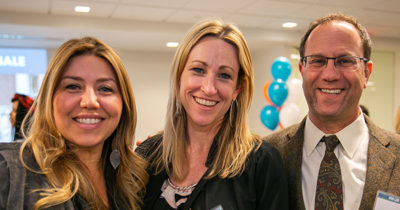
Masterminds and Mega Mentors: Advice from the Pros
Two new mentoring programs offer students a chance to learn and get advice from skilled professionals.
Masterminds as Mentors for Women Entrepreneurs »
At the Founders Summit, Mentoring Goes Mega »
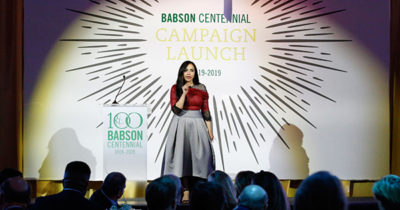
Babson Launches Largest Fundraising Campaign in its History
The College sets a fundraising goal of $300 million and aims to increase alumni giving.
Babson Launches Largest Fundraising Campaign in its 100-Year History »
]]>The founder of Alps & Meters, a luxury line of ski jackets and alpine sportswear, has been hands on with the Management Consulting Field Experience (MCFE) program for about four years, and says, “It’s very clear the kids at Babson exude entrepreneurship through every pore.”
Run by Arline MacCormack, associate director for Experiential Education, and management professor Joseph Weintraub, MCFE offers teams of students the chance to gain experience working with Boston-area business professionals.
As a professional with years of brand and creative experience in multiple global fashion companies, Joseph has been helping students learn experientially through MCFE while they provide his company with the latest innovation tools and resources.
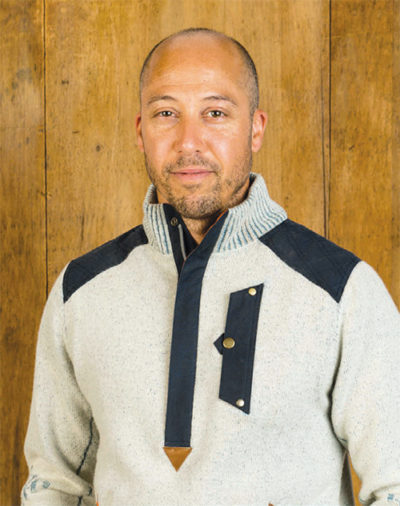
Louis Joseph MBA’05
In the past, students have contributed by assessing and developing Alps & Meters market entry strategy for women, as well as the company’s luxury customer experience approach.
Joseph says the students’ research methodologies drive insight and action, delivering positive return on investment.
“Babson’s MCFE teams are armed with cutting-edge research abilities, tools, and passion,” he says.
Joseph previously worked at K-Swiss as vice president of global marketing, at New Balance as global brand manager for running, and at Puma as global director of strategy and innovation.
In 2014, Joseph established Alps & Meters, which was inspired by a trip to Sweden. Products include polo shirts, vests, parkas, and backpacks.
Joseph says Babson students are adept when it comes to research and describes their approach as “incredibly sophisticated.” He attributes that mindset to faculty and leadership who have a wealth of entrepreneurial experience.
“It’s been a fantastic extended relationship. I continue to be impressed with the student body, who are effectively on the cutting edge of the next wave of entrepreneurial endeavors.”
Joseph considers Babson a continuous partner and resource for his success.
“Mentorship for me is a virtuous cycle,” Joseph says, adding that he has acquired research skills, financial model possibilities, and improved marketing frameworks from working with the students. “I’ve learned legitimately as much from the students as they’ve learned from me.” – Bryan Lipiner
]]>The professor known as ‘Dr. Failure’ leads a bustling, global life
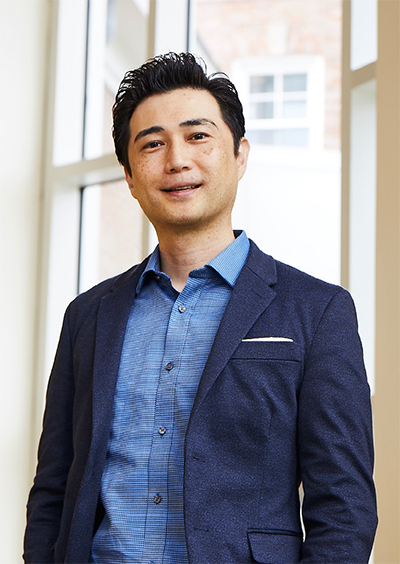
Yasuhiro Yamakawa
Photo: Pat Piasecki
To see Yasuhiro Yamakawa’s online calendar is a bit astonishing. Block after block of time is filled. When others see it, they ask when he has time to eat lunch or dinner.
“We always teach our students to be in action, to learn while doing. I’m just practicing what I’m teaching,” says the associate professor of entrepreneurship, who’s affectionately known as “Dr. Failure” for teaching students to welcome the setbacks that inevitably come in entrepreneurship and business.
Yamakawa has much to keep himself busy. Beyond his work at Babson, he is involved in 16 U.S. and international businesses as an investor, advisor, or board member. Based in Boston, he travels regularly, and he even makes time for a lunchtime ice hockey game three days a week. “I like to be in motion all the time,” he says.
One place Yamakawa frequents is Japan. He was born there, though he moved frequently as a child and continued the wayfaring life as an adult. In all, he has lived in eight countries. “Whenever there was an opportunity for me to jump on something, I moved,” he says.
Once he finally landed at Babson, however, he stopped. He has been at the College for 10 years. He finds it inspiring, and he enjoys interacting with his action-oriented students. “This is the longest I’ve ever stayed in one place,” he says. “I have a good reason. I just love Babson.”
In Japan, Yamakawa leads undergraduate and MBA elective abroad courses. He also is the executive director of Venture Café Tokyo, which hosts a weekly gathering of entrepreneurs, intrapreneurs, investors, educators, and students.
Yamakawa speaks regularly to colleges and companies in Japan. Failure is a frequent topic, which can make businesspeople uncomfortable. “Everyone goes silent,” he says. “Everyone starts looking down.”
Many in Japan see failure as source of embarrassment. So Yamakawa’s message, that failure should be embraced for the many important insights it can offer, is a startling one to Japanese audiences. “It’s all about failing, learning, pivoting, and finding the most successful pathway,” he says.
Yamakawa knows that changing an entire country’s culture is not easy, but when he finishes his talks on failure in Japan, he often receives a standing ovation. – John Crawford
When the Lab Meets the Classroom
David Blodgett integrates his diabetes research into his classes in multiple ways
David Blodgett doesn’t remember anything from his Type 1 diabetes diagnosis just before his third birthday, but that milestone has shaped some of his life’s work in indelible ways.
Blodgett, an assistant professor of biology who joined Babson’s faculty in 2012, also is a diabetes researcher at the University of Massachusetts Medical School, focusing on beta cell gene expression patterns. He and his colleagues examine differences and changes in hormone-producing human pancreatic islet cells, which come from donors who had Type 1 or Type 2 diabetes, were prediabetic, or didn’t have diabetes. Observing those characteristics may be the key to understanding how the diseases develop, and how to treat them.
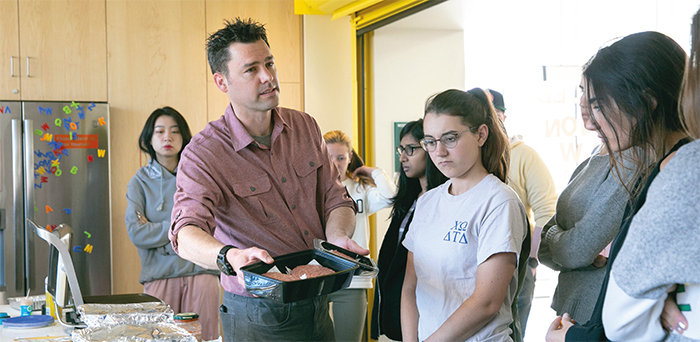
David Blodgett
Photo: Paige Brown
His academic sweet spot is at the intersection of teaching and research, where he can include some of the processes and findings of his research in classes on human biotechnology and sustainable food systems. “For human biotechnology,” he says, “if we’re talking about reprogramming stem cells to become beta cells, that ties back to genetic engineering and personalized medicine.”
Case Studies in Sustainable Food Systems examines the pathways food takes from farm to table, and includes topics such as food security, technology, GMOs, conventional versus organic farming, food waste, and agriculture and climate change.
In this class, Blodgett highlights his thought processes and the systematic ways of doing research to analyze a situation. “For example, plants that are grown in soil—how is that soil treated, and what are the consequences of those treatments? What conclusions can you reach, which ones can’t you reach, and what additional data do you need? These are the same things I ask myself in my research.”
Blodgett likes having two worlds to work from. “I’m lucky enough to have those two perspectives,” he says, “and I think that makes me a better teacher and a better researcher.” – Jeannine Stein
]]>That meant she’d need to learn how to pitch to potential investors, something out of her wheelhouse. Jaffar knew this process wouldn’t be painless. There would be tough questions. And challenges. And more questions. Lots of questions.
“We had to do it,” she says of the practice pitch sessions done during the Summer Venture Program, a business accelerator that’s part of The Arthur M. Blank Center for Entrepreneurship. “We needed to feel uncomfortable, and we needed to be OK with that feeling, because this is going to happen—this is going to be real.”
That experience allowed Jaffar to up her game—and her self-assurance. “I realized,” she says, “that people could look at me and say, ‘She’s good, we want to give her a chance.’”
The business world doesn’t always offer men and women a level playing field when it comes to starting an entrepreneurial venture. Women who want to start companies or take their entrepreneurial mindset to startup or corporate executive roles may face daunting challenges. They are often passed over as leaders, denied representation in C-suites, challenged on their knowledge and skills, find it considerably more difficult than men to secure funding for new businesses, and lack established networks that can help them succeed.
But women like Jaffar are finding that they can gain a decided advantage with a solid business education, undergraduate and graduate, that emphasizes entrepreneurship and experiential learning. That type of education happens in the classroom and via programs offering coaching and mentoring, plus guidance in building essential networks. In Jaffar’s case, her pitch for an eponymous modest and fashionable clothing line earned her a finalist spot in the Blank Center’s B.E.T.A. (Babson Entrepreneurial Thought & Action®) Challenge, which celebrates entrepreneurs who are bringing their business ideas to life. She also was given support from the Babson Seed Fund and received the Sorenson Scholarship Award for Meritorious Achievement. Jaffar was awarded the Female Founder Impact Award from the Center for Women’s Entrepreneurial Leadership (CWEL), one of few business school centers in the country that focuses on women. After graduation, Jaffar moved to New York, where she is working full time on her venture, and “continuing the road that Babson paved for me.”
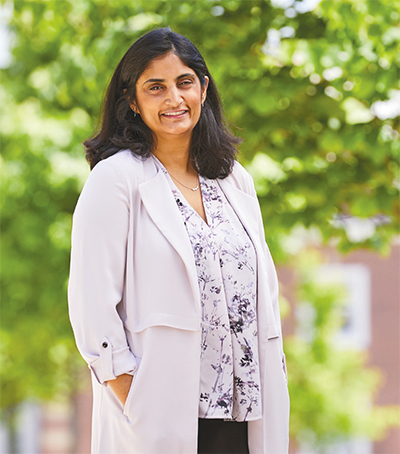
Lakshmi Balachandra, assistant professor of entrepreneurship
Photo: Pat Piasecki
For any industry, “the more knowledge and prep you have, the better,” says Lakshmi Balachandra, an assistant professor of entrepreneurship who teaches Foundations of Management and Entrepreneurship, a required first-year course where students work in teams to build, launch, and run an actual business. Similarly, Babson’s Management Consulting Field Experience (MCFE) pairs Boston-area companies with student teams who work as consultants on actual business challenges.
“When you come to an entrepreneurship class,” Balachandra says, “you learn about the foundations of building a business plan, and how to prepare the financials the way investors want to see them. Having that educational component gives you a huge leg up.”
But the most important component, she adds, may be learning how to work with other people: “How do you lead, how do you communicate with investors, how do you manage all these moving parts?” That students are thrown into these situations from day one makes the program unique, and offers women opportunities they may not get in the real world, especially starting out. Balachandra adds that she has seen more women pursuing and attaining leadership roles in the class, “and that has been incredibly exciting.”
From Mentee to Mentor
“I don’t think you can go into entrepreneurship without thinking it will be hard,” says Mackenzie Page ’20. Choosing entrepreneurship factored into her becoming a CWEL Scholar, which not only provided a partial scholarship, but also tremendous opportunities for working with a mentor, becoming a mentor, and creating a network of like-minded women.
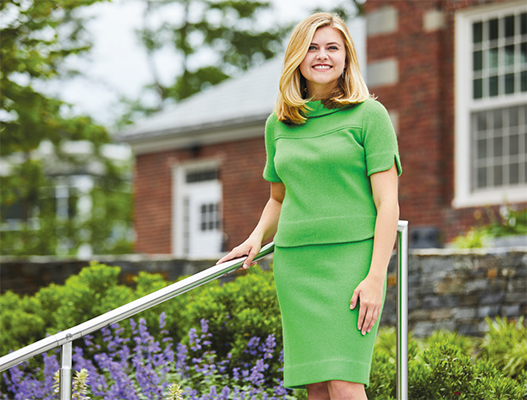
Mackenzie Page ’20, a CWEL Scholar
Photo: Pat Piasecki
Page’s CWEL experiences have been profound. “When I first came to Babson, I had a really great peer mentor,” she says. “She was excellent in showing us how strong we could be, how much we could embrace—she was a great role model, and this was my first glimpse into what a mentorship can be.”
Taking part in CWEL networking sessions has allowed Page to feel comfortable approaching complete strangers in business-social settings, which can be daunting for some. “It has really lifted my confidence,” she says. In her first-year FME class, she was a co-CEO with a male classmate, and learned how creative problem solving could tackle tough challenges. In her second year, she became an FME mentor to first-year students, which she calls “a fantastic experience.”
Changing the System
Make no mistake—educational programs that help women become entrepreneurs are no indication that women’s skills and abilities are inferior to those of men.
“The solution to challenges women face in starting and growing businesses is not just to educate, train, or fix the women” says Candida Brush, vice provost of global entrepreneurial leadership and the F.W. Olin Distinguished Professor of Entrepreneurship. Rather, the system needs to change. A male-dominated finance industry, for example, needs to recognize that women-owned businesses are worthy of investing.
“One of the reasons why Babson’s WIN (Women Innovating Now) Lab® was created,” she adds, “was because women were being left out of highly competitive venture accelerators. The education and mentoring that the WIN Lab provides is the same support available in other accelerators.” The WIN Lab, which is part of CWEL and found at Babson’s Boston and Miami campuses, allows women to expand their ventures by testing and tweaking their ideas. Women also have access to experts in various fields, and opportunities to showcase their company and be coached on how to pitch.
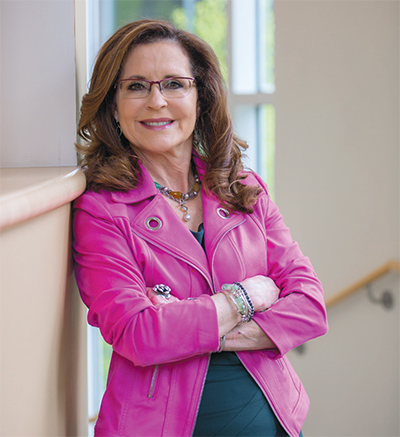
Susan Duffy, executive director of CWEL
Photo: Dan Vaillancourt
Susan Duffy, CWEL’s executive director, says the center adds to the “already exceptional functional education that Babson is providing. This center is about building that successful entrepreneurial leader and giving them the tools they need to identify opportunities and overcome challenges that may arise as they navigate their careers.” Combining mentorship, leadership acumen, networking, and immersive learning experiences, she adds, “CWEL emphasizes business skills, while creating opportunities for emerging women leaders to build their self-efficacy— something that research tells us is vital to success.”
At her summer internship working in data operations and analytics for an insurance group, Page already can see the benefits of what she has learned, including presentation skills she has drawn on for her job. “In FME, you have to do presentations throughout the year, and that helps you build up your confidence,” she says. “Early on at Babson, it was quite apparent to me what the College was preparing me for. Like most people I’m nervous on my first day of a new job, but it’s great to remind yourself that you have tons of classwork and experience under your belt.”
]]>But Spinelli is an entrepreneur, and, as of July 1, he became the new president of Babson, the home of entrepreneurs of all kinds. He looks at all the doubt and upheaval a bit differently from others. He sees not chaos, but possibility. “The level of change in the world is so dramatic,” he says. “From an entrepreneur’s perspective, this is our time.”
A long-time member of the Babson community, who first stepped foot on campus in the 1980s to begin pursuing his MBA degree, Spinelli takes over leadership of the College as it’s celebrating its Centennial and looking ahead to its second century. Well-acquainted with the institution’s people and its prowess, Spinelli is confident that Babson is well-poised to adapt and thrive in this age of disruption.
“We have all the skills. We have the history. We have the intellectual content. We have the reputation,” he says. “We just need the courage to be bold.”
On a Mission
Spinelli considers his new job the culmination of a career that has spanned both business and academia. In 1979, he co-founded Jiffy Lube International and went on to become the oil change giant’s largest franchisee. Later, he spent 14 years working at Babson as a faculty member, provost, and director of The Arthur M. Blank Center for Entrepreneurship.
Leaving Babson in 2007, he began a long-term tenure as president of Philadelphia University, ultimately leading a merger of the school with Thomas Jefferson University in 2017.
Spinelli says the job of a college president is fulfilling, but it’s also all-encompassing. Students and alumni from Philadelphia University reached out to him constantly from early morning to late at night. “I was immersed in Philadelphia,” he says. “It was intense, a hundred hours a week for 11 years.”
In 2018, Spinelli considered retiring after leaving Philadelphia University, now renamed Jefferson. But then Babson came calling. The chance to return to the College as its 14th president was too compelling an opportunity to pass up. “It was a homecoming of sorts,” says Spinelli, who doesn’t look upon his new post as just another stop in his long career. “It is a mission, not a job,” he says.
12 Years Later
With Spinelli back on campus, Babson alumni, faculty, and staff who knew him years ago may notice something different about him, namely that the man is now a wearer of hats, sporting fedoras in the winter and straw hats in the summer.
Spinelli assures that this new fashion choice isn’t a matter of style, but rather because he developed a hypersensitivity to ultraviolet light in his 50s and needed to cover up. “When I first started wearing hats, it was semi-embarrassing, because people think you’re trying to be cool and stylish,” he says. “I am not cool or stylish. There are a lot of things I am good at, but cool and stylish I’m not.”
Coming back to campus 12 years after first leaving for Philadelphia, he admits, was a bit surreal at first: “I like calling it a Back to the Future moment.” He was struck immediately by the students’ maturity and know-how. “The level of sophistication is most startling,” he says. Spinelli has marveled at the intensity of the questions asked at an eTower meeting. He has talked with student entrepreneurs who have the presence and smarts of someone years beyond their age.
He is pleased by the continued growth happening at Babson, considering that he first arrived on campus when entrepreneurship was still getting its sea legs at the institution. “It wasn’t even a division when I got here,” he says.
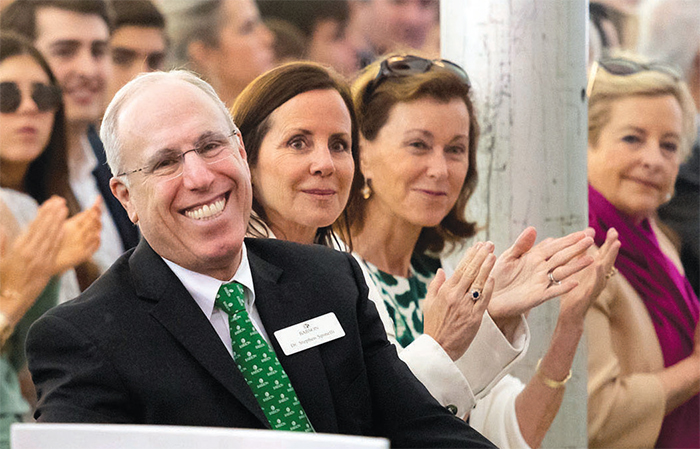
President Stephen Spinelli Jr. MBA’92, PhD at Babson’s Centennial Commencement ceremony.
Photo: Justin Knight
When he was a professor, Spinelli’s colleagues were pioneers of entrepreneurship at the College, professors William Bygrave and Jeffry Timmons. Spinelli and Timmons co-authored several editions of a book, New Venture Creation: Entrepreneurship for the 21st Century, that lays some of the groundwork for what would become Entrepreneurial Thought & Action®, the College’s key methodology for developing an entrepreneurial mindset.
When he returned to campus earlier this year, Spinelli saw how the seeds of entrepreneurship had continued to grow and flourish in his absence. “I saw how that lineage had grown, and that was motivating, exciting, and energizing,” he says. “Seeing that growth, you say, ‘Is there anything left to do?’ To be honest, there’s plenty.”
The Need for Knowledge
Spinelli takes over at Babson in a time of tumult in higher education. Dwindling enrollments and changing demographics are among the challenges many institutions are facing. Since 2016, more than 100 colleges and universities in the U.S. have closed. “Everybody is scared to death about what is going to happen in the future of higher education,” he says.
To counter that fear, Spinelli poses a question: Will the need for learning and knowledge be greater today or tomorrow? Or how about this year versus next? Spinelli believes that as the world continues to change so briskly, the need for education and continual learning will only increase.
That’s good news for colleges. If they’re open to collaboration and willing to adapt, Spinelli believes that they can prosper and meet that never-ending demand for knowledge. “Opportunity starts with demand,” he says. “If there is demand and we put together a business model that can fulfill that demand, we’re going to win.”
Spinelli warns that Babson is not immune to the market forces affecting higher ed, and the College is now embarking on a strategic planning effort for the future (see “Share Your Thoughts on the Strategic Plan”). The world is full of change, and Spinelli vows that the College will be ready. “Change is fertile ground for Entrepreneurial Thought & Action,” he says.
To be sure, the need for entrepreneurship education is not going away. In fact, Spinelli feels that the ability to think like an entrepreneur could become a required competency for the workplace. Who is better at navigating uncertainty and creating value than an entrepreneur?
“You should be thinking that way as an administrative assistant or a founder of a company or a general manager or an accountant. I do believe that,” says Spinelli. “The impact of Babson could be even greater over the next 20 years or 100 years than it is today.”
]]>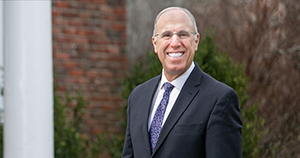
He was a Babson student, a professor, and an administrator, and now Spinelli is poised to lead the College, starting this summer.
Stephen Spinelli Jr. MBA’92, PhD Named Babson’s 14th President »
Breaking the Cycle of Incarceration
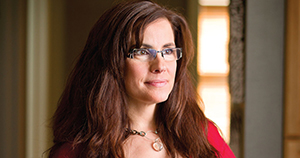
In professor Elizabeth Swanson’s human rights class, students work with inmates on entrepreneurial ventures that they can pursue once released.
Can Entrepreneurship Reduce Recidivism? This Babson Professor Says Yes »
Toyoda, Case Chosen as Commencement Speakers
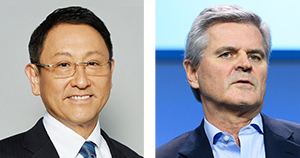
Renowned entrepreneurs Akio Toyoda MBA’82, P’14 of Toyota Motor Corporation and AOL co-founder Steve Case will deliver speeches at Babson’s 2019 Centennial Commencement.
Global Business Leader Akio Toyoda MBA’82 to Deliver Graduate Centennial Commencement Address »
Internet Pioneer Steve Case to Deliver Undergraduate Centennial Commencement Address »
The New Babson MBA Debuts
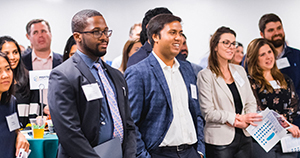
See how this updated MBA features customization options, more electives, intensity tracks, and is in tune with today’s job market.
Get to Know Babson’s New MBA »
Ken Matsuno Appointed Dean of Faculty
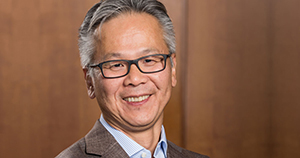
In his new role, the Marketing Division professor will head up full- and part-time faculty and serve on the President’s Cabinet, Academic Council, and the Operating and Finance Committee.
Dr. Ken Matsuno Named Babson’s Dean of Faculty »
The Campus Gets a New Park

Kerry Murphy Healey Park, named for the College’s 13th president, will feature the Babson Globe, Fountain of Flags, and a statue of Roger Babson.
Centennial Park to Be Named in Honor of President Kerry Healey »
Success Starts with a Coach
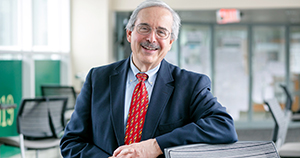
Getting an edge on career achievement starts with coaching and mentorship, says professor Joseph Weintraub, founder of the Coaching for Leadership Teamwork Program.
Making the Babson Experience Meaningful, One Coaching Session at a Time »
The Barefoots Endow Athletics Director Position
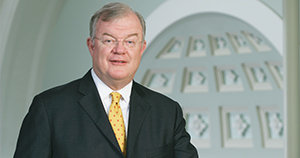
Babson president emeritus Brian M. Barefoot ’66, H’09, P’01 and wife Pamela P. Barefoot P’01 have donated $2 million to endow the Athletics Director position and inspire others.
Christine and Michael Angelakis Support Education
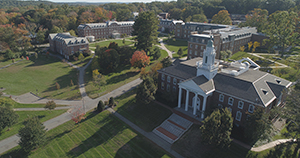
During Babson’s Centennial year, Christine ’86 and Michael Angelakis ’86 give a $6.8 million gift for financial aid and unrestricted support to the College.
Angelakis Family Gift Advances Entrepreneurship Education and Leadership »
]]>